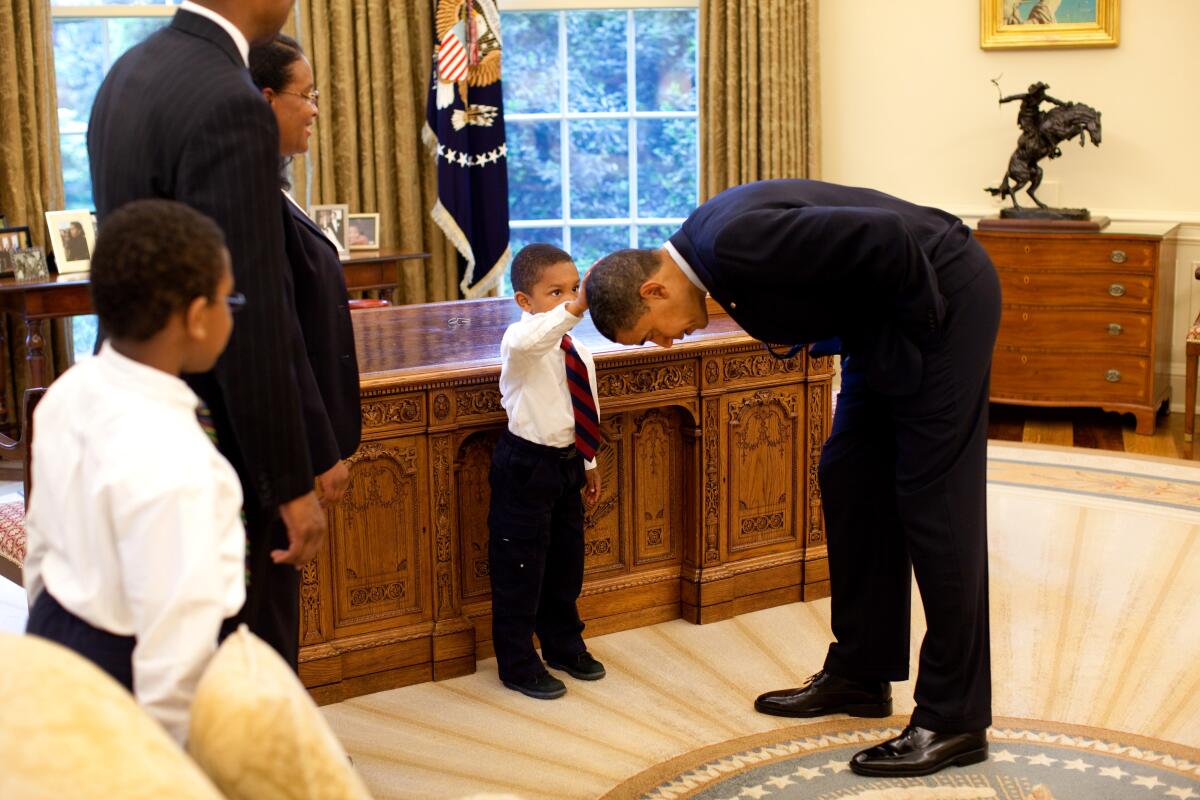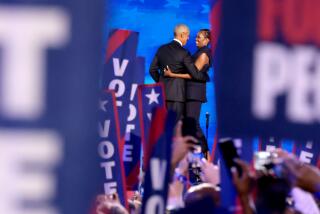Column: The boy who touched Obama’s head is graduating, with the ex-president’s congratulations

In each of the last two weeks, an 18-year-old American male has horrifically gripped the nation’s attention, one for allegedly gunning down 10 Black people at a grocery store in upstate New York, the other for slaughtering 19 Latino fourth-graders and two teachers at a Texas school.
Those teens represent the worst of us, though as a nation we‚Äôre all complicit ‚ÄĒ for allowing such gun massacres to become common because of our political paralysis and our cultural fetish for weapons of war, and, a first in this century, because of conservative judges‚Äô misreading of the 2nd Amendment.
Spare some attention, however, for the countless other 18-year-olds, the Class of 2022 graduating from high schools nationwide and into adulthood with hopes ‚ÄĒ we hope ‚ÄĒ for their futures. And not just nationwide: I‚Äôd like to reintroduce one 18-year-old American, Jacob Philadelphia, who graduates Friday from the International School of Uganda just outside Kampala, where his father works in the U.S. Embassy.
Opinion Columnist
Jackie Calmes
Jackie Calmes brings a critical eye to the national political scene. She has decades of experience covering the White House and Congress.
Jacob has high hopes indeed: to become president of the United States.
I say ‚Äúreintroduce‚ÄĚ because many of us ‚Äúknow‚ÄĚ Jacob. We know him, however, as the 5-year-old Black boy at the center of one of the most famous photos of Barack Obama‚Äôs presidency. In the picture, the leader of the free world ‚ÄĒ the nation‚Äôs first Black president ‚ÄĒ is bowing in the Oval Office to a Black child who has just asked him whether his wiry hair is really like the boy‚Äôs own.
‚ÄúTouch it, dude!‚ÄĚ the president said, bringing his head even with the child‚Äôs, as I recounted in a story a decade ago about their encounter in 2009.
The photo that White House photographer Pete Souza hurriedly snapped, which to this day is an audience favorite in Souza’s popular speaking tours about his White House years, seemed to capture the promise inherent in Obama’s barrier-breaking election: That all Americans finally could imagine someone who looked like themselves in the nation’s highest office.
The photo represented hope and change, the bywords of Obama’s campaign. Yet now those sentiments are as faded as the iconic signs that once advertised them. And Jacob, now a young man, will soon return to the United States to attend the University of Memphis at a time when the once-heady talk of a post-racial society has given way to deep anxiety about racial regression.
Americans of his generation have come of age as witnesses to not only video-streamed racial injustice but, under Obama’s successor, also the mainstreaming of bigotry. They inherit a nation as divided as at any time since the Civil War, and they have endured two years of pandemic-enforced isolation that inhibited their education, social lives and, for many, their mental health.

Against that backdrop, Obama and Jacob reunited virtually this week, to mark the young man‚Äôs milestone. The 4¬Ĺ-minute minute video that The Times obtained of their exchange ‚ÄĒ with Obama in his Washington office, Jacob at school ‚ÄĒ will be shown at the graduation ceremony for Jacob‚Äôs class of about 60 multinational students.
A framed copy of the Souza photo hangs in Obama’s office. The former president says, “I think this picture embodies one of the hopes that I’d had when I first started running for office.
‚ÄúI remember telling Michelle and some of my staff, ‚ÄėYou know, I think that if I were to win, the day I was sworn into office, young people ‚ÄĒ particularly African American people, people of color, outsiders, folks who maybe didn‚Äôt always feel like they belonged ‚ÄĒ they‚Äôd look at themselves differently to see a person who looked like them in the Oval Office. It would speak to Black kids and Latino kids, gay kids and young girls. They could see the world open up for them.‚ÄĚ
Of course, Jacob didn‚Äôt grasp any of that at the time. He recalls thinking Obama ‚Äúwas just my dad‚Äôs boss‚ÄĚ ‚ÄĒ his father, Carlton Philadelphia, worked then at the National Security Council and was about to take a State Department post in Mexico ‚ÄĒ and especially remembers being intimidated by the large office ‚Äúand him towering over me.‚ÄĚ But Jacob got the deeper meaning soon enough.
Dawn Porter‚Äôs documentary ‚ÄúThe Way I See It‚ÄĚ profiles White House photographer Pete Souza, who served under both Ronald Reagan and Barack Obama.
‚ÄúThat was a pretty big highlight of my life,‚ÄĚ he says in the video. ‚ÄúIf I get to see another Black man be at the top, be at that pinnacle, then I want to follow that lead.‚ÄĚ
His mother, Roseane Philadelphia, told me in a phone interview from the family‚Äôs home in Kampala that Jacob over the years dreamed of being one thing and then another, but ‚Äúthe only thing‚ÄĚ that‚Äôs been consistent is his desire to ultimately become president. ‚ÄúThat‚Äôs why he‚Äôs going to study political science,‚ÄĚ she said.
Obama asked Jacob whether moving abroad from place to place had been hard on him ‚ÄĒ perhaps channeling Obama‚Äôs own childhood experience following his anthropologist mother from Hawaii to Indonesia.
‚ÄúIt‚Äôs kind of difficult,‚ÄĚ Jacob replies, speaking for himself and brother Isaac, 21. ‚ÄúBut at the end of the day, we get to see a lot of things that a lot of other kids don‚Äôt get a chance to. We get to talk to people and see their ideals for how they want to change the world.‚ÄĚ
‚ÄúI think the White House visit clearly inspired you,‚ÄĚ Obama says. ‚ÄúI hope.‚ÄĚ
We hope too.
For Jacob and the rest of his generation, we must reclaim hope. And act, beyond thoughts and prayers, to help them make it a reality.
More to Read
A cure for the common opinion
Get thought-provoking perspectives with our weekly newsletter.
You may occasionally receive promotional content from the Los Angeles Times.












